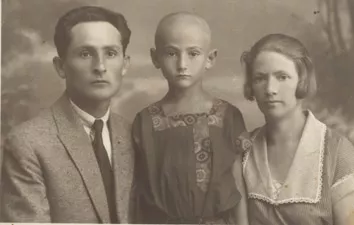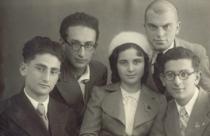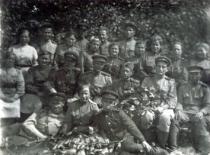This is me, Boris Molodetski, with my parents Gersh Molodetski and Chaya Molodetskaya. This photo was taken in Odessa in 1928.
My parents got married on 7 June 1919. They had a civil ceremony. There was no religious wedding. My parents settled down in a basement in the end of Bazarnaya Street. I was born in Odessa on 10 August 1921. I remember myself in a small damp room on the ground floor of a brick house in 10, Bolshaya Arnautskaya Street. For me the greatest pleasure was to get into my father's bed when he brought coal from the basement in the morning and watch him stoking the stove. We had a cooperative of tenants and housing manager. Tenants arranged meeting to discuss any maintenance issues in the yard. They brought down chairs, a table and someone put a bulb out of their window. We got along well with our neighbors. When in 1925 a three-bedroom apartment on the 2nd floor in our house got vacant a meeting of tenants decided to give it to us. There was a tiled stove in a big room, an old folding oak dining table, a sofa and a cupboard that my parents ordered from a cabinetmaker. It was very beautiful with stained glass folds and copper shields at the bottom. There were two beds with string mattresses in another room, a small desk, a sideboard and a wardrobe. There was an old box with copper belts around it in the hallway. My mother kept old clothes in it. In summer she aired them on the balcony. There were ostrich feathers, my mother's old embroidery pieces and an unfinished quilt rug. There were embroidered napkins on the furniture in our apartment. In 1928 our house was overhauled and the floors painted to imitate parquet.
My mother was a housewife. She was raising me. She never let me play with other boys in the street. She told me that they would teach me bad things. I was sitting on the balcony suffering terribly. My mother took me for walks always holding me by my hand. During such walks I learned to read on store signs. It was the second half of NEP, and there were many colorful signs on private stores. My mother and father spoke Russian at home, but when they decided that there was something I shouldn't know they switched to Yiddish. I knew some words in Yiddish.
My father worked as an accountant in Tserabkoop on the corner of Pushkinskaya and Deribassovskaya Streets. He audited stores and shops. Once I heard him saying to somebody 'Just go away, I want to sleep quietly'. And then the door closed. It was a guilty director of a store asking my father to come to his help. My father didn't have many clothes, but he kept them clean. At work he wore black over sleeves. I remember that for three years in a row he wore a khaki shirt, boots and trousers of thick fabric. It turned out that it was prison wardens' uniform and he managed to get one somehow. My father was a melancholic person. He had acting talents. When we had guests occasionally he used to read Sholem Alechem to them in Russian and Yiddish. We visited my father's colleague Spivak in Pochtovaya Street. Those were quiet evenings: they talked and told jokes. There was no singing, dancing or drinking.
My parents were not religious. I was a convinced atheists and turned my head away when I passed by a church. We celebrated Soviet holidays at home, but never Jewish holidays. We lived a modest life, but we always had good food. My mother believed food was of the utmost importance. She could make do with whatever she had to wear, but she liked to eat heartily and loved to make food for us. My mother valued chicken. Our standard lunch consisted of chicken broth with rice and a piece of chicken with garnish. She also cooked gefilte fish and dishes from matzah. However, she rarely cooked with matzah since we could only get it at the synagogue and at this period it had to be done in secret. When I got ill my mother made me cutlets from big bullheads. I liked them so much that I used to tell mother 'I wish I got ill!' She cooked on a primus stove. I was responsible for the stove: I had to refill kerosene, watch needle stocks and clean the head. I took the stove to the open staircase behind the backdoor, took the head and stretching my hands off the handrails cleaned the soot. Sometimes I had to go stand in line for kerosene at 5 o'clock in the morning. I used to stand 3-4 hours before I could buy 2 liters of kerosene.




















